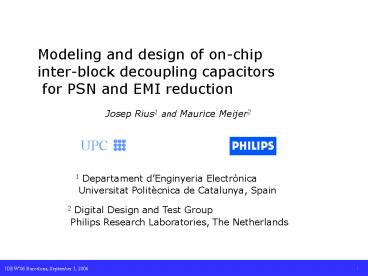Sin t - PowerPoint PPT Presentation
1 / 17
Title: Sin t
1
Modeling and design of on-chip inter-block
decoupling capacitors for PSN and EMI reduction
Josep Rius1 and Maurice Meijer2
UPC
1 Departament dEnginyeria Electrònica
Universitat Politècnica de Catalunya, Spain
2 Digital Design and Test Group Philips Research
Laboratories, The Netherlands
2
Motivation
high frequency content of PSN
EMI
Small gate switching times
Dimensions comparable to the wavelength of the HF
components
- On-chip decoupling capacitors (decaps)
- Effective solution to reduce power supply noise
(PSN) - Decreases current loops thereby reducing EMI
- Design constraints performance, leakage,
This work concerns a model and design
procedurefor on-chip MOS decaps targeting PSN
and EMI reduction
3
Proposed Decap Model
NMOS decap
l
VDD
ALL PARAMETERS ARE PER UNIT LENGTH
GND
GND
rG
c
i(v)
r
n
n
p
p
(B)
cB
rB
substrate
- Model characteristics
- Distributed RGC model to take into account HF
effects - Gate leakage modeled by a voltage-dependent
current source
4
Proposed Decap Model (cntd)
NMOS decap
ALL PARAMETERS ARE PER UNIT LENGTH
- Model simplification
- Exploit symmetry of the decap
- Poly gate resistance (rG) ltlt channel resistance
(r) - Channel-to-substrate capacitance (CB) neglected
5
MOS Decaps Analytical Solution
Diffusion equation with proper boundary and
initial conditions
Channelterm
Gate leakageterm
Steady-state response can be separated into DCAC
solution
6
Example DC response.
Drop voltage along the channel increases as tOX
is reduced
Drop voltage along the channel increases with
channel length
l 10mm , w 3mm,
w 3mm, 65nm CMOS
90nm CMOS
l 5mm
l 10mm
65nm CMOS
45nm CMOS
l 20mm
l
l
0
0
Normalized voltage along the channel
Normalized distance alonga half of channel length
7
Example AC response. No leakage case
1.1
1
VM ejwt
r, c
0.9
v(x,t)
d
d
x
0.8
0
l
-l
maximum effective decap length ?
Amplitude A(x) changes along the channel. It
depends on r and c as well as w
8
Example AC response. Leakage case
1.1
1
VM ejwt
r, c
g
0.9
v(x,t)
d
d
x
0.8
0
l
-l
Now dL can be approximated by
Amplitude A(x) changes along the channel. It
depends on r , c and g as well as w
9
Input Impedance of a MOS Decap
l
r, c
g
ZIN
- Critical frequency at l?
- The frequency that separates lumped and
distributed behaviour - Lower critical frequency in case of gate oxide
leakage
LEAKAGE
NO LEAKAGE
10
Normalized R and C as a function of frequency
11
Intra-block and Inter-block MOS decaps
- Intra-block decaps have constrained dimensions
- For example, the are implemented in the
standard-cell template - Inter-block decaps do not suffer from this
constraint - Typically, used for EMI reduction purposes
System-on-Chip
Digital logic block
12
Example Inter-Block Decap Gate length must be
limited
13
Example Inter-Block Decap Fingers and Stripes
Finger
VDD
GND
Stripe
VDD
GND
Stripe
VDD
14
Inter-Block Decap Model Parameters
- Model parameters are defined to be independent
of length and width
Channel sheet resistance W/?
Gate capacitance per unit area F/m2
Gate oxide conductance per unit area S/m2
Gate current density per unit area A/m2
Total gate area m2
Critical frequency
Total gate-oxide leakage
15
Procedure for Optimum Inter-Block Decap Design
1. Define the total decoupling capacitance CDEC
to be included in the IC
2. Determine the effective total area as
3. Obtain the gate length of a finger LF0
to get the maximum frequency fC for which
the decap needs to perform
4. Define the number of gate fingers as
5. Obtain the gate length of a single decap as
6. Define the number of stripes as where WMAX
is the maximum allowed gate width
7. Obtain the gate width of a single decap as
8. Calculate total leakage
16
Example
Total decap area vs. fC
red tox 6.5 nm magenta tox 5 nm black tox
1.6 nm
- 90nm GP technology
- Required decap CDEC 1nF
- Three gate-oxide thicknesses
Gate length of a finger vs. fC
red tox 6.5 nm magenta tox 5 nm black tox
1.6 nm
- Results
- Area factor 1.01 to 1.23
- Total leakage current
- ILEAK 1.1 mA
17
Conclusions
- Distributed decap model based on physical
grounds - Relevant parameters for each technology node are
easily obtained - Such parameters are independent of dimensions
for inter-block decaps - Critical Frequency fC qualifies decoupling
performance - Defines the border between full and reduced
decap performance - Relevant expressions have been derived
- Simple procedure to design inter-block decaps
based on the proposed model































